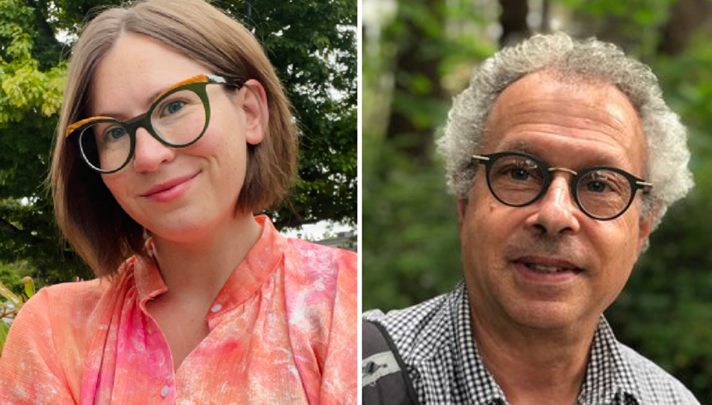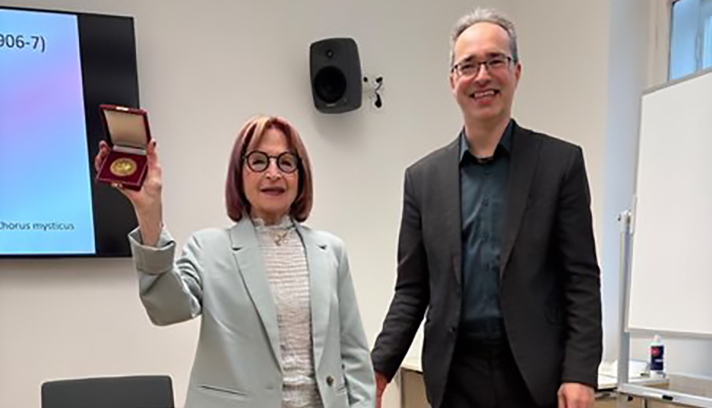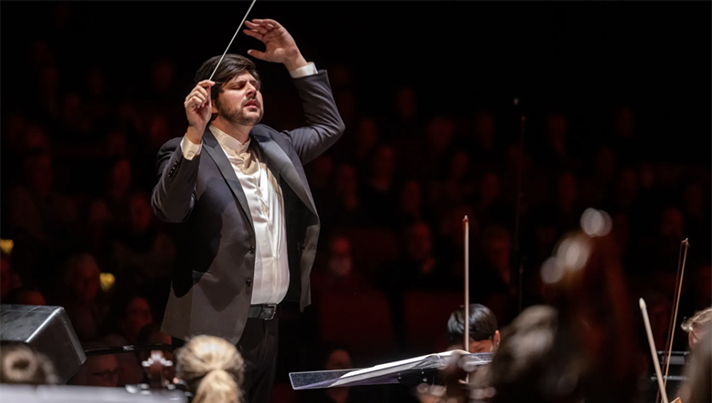We are sad to announce the passing of Professor Hans-Karl Piltz, a talented violist and teacher who helped shape the School of Music as it evolved from a small Bachelor of Arts program in the late 1950s to the large and thriving School it is today. Prof. Piltz was 96 years old.
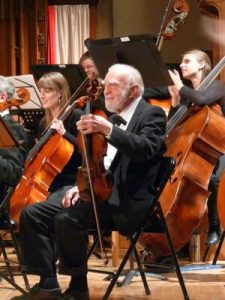

Prof. Hans-Karl Piltz
Prof. Piltz was born in Germany and grew up in Chicago, where he was introduced to string instruments in high school. He served in the U.S. Army for three years, fighting in Europe during World War II. Upon returning home, he immersed himself in the study of viola, first with the principal viola of the Chicago Symphony Orchestra and then at Northwestern University. He worked for several years as a professional orchestral musician, including stints as principal viola with the Arkansas and Atlanta Symphonies.
Prof. Piltz loved teaching, and in 1959 joined the UBC Department of Music — as the School of Music was then known. This was a formative time for the department: the Bachelor of Music degree was introduced that year, and to meet the needs of the new program, UBC hired a cohort of talented and ambitious faculty, including Prof. Piltz. As Professor of Viola, he mentored several generations of strings musicians who have gone on to long and successful careers in orchestras and as soloists in North America, Europe, and all over the world. He founded and directed the UBC Symphony Orchestra from 1959–1970 and also helped found the Vancouver Society for Early Music — now known as Early Music Vancouver — in 1969.
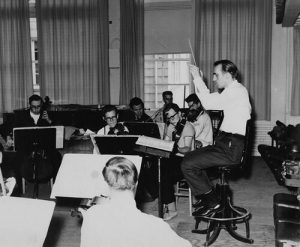

Prof. Piltz retired from UBC in 1991 at the age of 65 but remained very active as a musician and teacher in Vancouver. He played viola with the Pro Nova Ensemble, a chamber group, and performed many concerts every year at public schools across the Lower Mainland.
Even after he developed arthritis in both hands, Prof. Piltz continued to play the viola d’amore with a small group of gamba players. Well into his nineties, he kept himself busy arranging and adapting for the viola Late Renaissance and Romantic music written for other instruments. His goal, as he explained recently, was to create “a library of materials for violists that may help develop another marketable professional possibility. Of course, maybe more importantly, it adds another repertoire just for the violist’s pleasure in making music.”
Ever the teacher and mentor, Prof. Piltz struck up a friendship with Marina Thibeault, the School of Music’s new Assistant Professor of Viola, upon her arrival in Vancouver this past autumn. You can read her tribute and many others, below.
Tributes
Hans-Karl Piltz and I met backstage after my UBC debut on October 9th 2019, where I performed in front of my new family, with my long-time friends and musical partners, pianist Philip Chiu and clarinetist Jean-François Normand. Prof Piltz and I immediately discussed string pedagogy & engagement and made plans for meeting soon again.
I was blessed with a polite knock on my office door from time to time and short visits from him in between lessons. These lovely encounters would automatically fill the next viola lesson or chamber music coaching with a tremendous amount of energy! I did not realise that my new friend was 96. He was driving to school, attending many concerts (sometimes during the day, sometimes in the evening, sometimes both in one day).


Hans-Karl Piltz and Marina Thibeault (Image: Marina Thibeault)
The string division had expanded the offerings for StringFest this year, and I felt compelled (and proud) to invite him to a few events that I thought he would particularly enjoy. He, of course, wanted to attend most activities, but was also a dedicated caregiver to his wife, Irene. I saw him twice that week, lucky me. The Tuesday String divisional concert, showcasing a few of my students playing in solo and duo settings, and the grand finale concert, featuring three Brandenburg Concerti by J.S Bach. Hans-Karl was the founder of the Vancouver Society for Early Music in 1969 – now known as Early Music Vancouver. I sat next to him with my two-year-old for this event. I felt that I had reached absolute bliss, watching the students play with such professionalism and ease, alongside my new friend, and my little boy who was soaking up every musical gesture. Read more
– Marina Thibeault, Assistant Professor of Viola and Chamber Music
Hans-Karl founded the UBC Symphony Orchestra and was its conductor from 1959-1970. Back in 2015, we honoured him at a UBC Symphony Orchestra concert on December 4th which marked the 56th anniversary of the first UBC Symphony Orchestra concert in 1959. It was very special to have him on stage and to share a few early stories about the beginnings of what was to become the UBC School of Music. He was always a tremendous advocate for the power of making music together and I am deeply saddened to have learned of his passing.
– Jonathan Girard, Director of Orchestras
What an amazing life Hans-Karl Piltz has had with a vast breadth of influence. Prof. Piltz has been such an important part of my UBC experience since day one! He was on the panel that auditioned me in 1979, he was my advisor throughout my degree and I had a viola lessons with him as part of class strings (since I played violin). And of course, over recent years I have been delighted to chat with him at Wednesday Noon Hours and other concerts at the School. He was an important influence in my life. There are so many fond memories that will be cherished.
I’m thrilled that he connected with our current faculty and recognized. At a concert on December 4, 2015, Prof. Jonathan Girard, current conductor of the UBC Scymphony Orchestra honoured Hans-Karl as the first conductor of the orchestra. A framed photo of Hans-Karl conducting the orchestra was given to him on the 56th anniversary of the first performance of the orchestra December 4, 1959. It was a beautiful evening giving a salute to the founder of the orchestra.
More recently I witnessed the immediate spark of friendship between Hans-Karl and our new viola professor Marina Thibeault. I brought him backstage after her UBC debut recital, facilitated the introduction and then stood back thrilled to see them both ignite in happy viola talk.
His memory was amazing as was the obvious delight he took in sharing ideas, thoughts about the state of the School and how things were done back in the day (always detailed and so very logically thought out and presented) and comments about the concerts he attended. He did like to press his case on some subjects. And those I often received by e-mail. With lovely pictures painted in words, very good humour and gentle nudges, he pointed out something in the printed programmes, programming, performances. These commentaries, suggestions on improvements and tangents to reflections on his own performances so long ago showed he really cared. He always had a smile and a chuckle and even in the emails I could detect his very endearing smile. A couple of examples:
“I also noted that the pianist, wearing a pair of black trousers that ended up in two bright golden shoes, matched perfectly, the legs of the piano, which looked sometimes like a spidery 5 legged Steinway Grand.”
“I thought the clarinet was way too loud for the dulcet tone of the viola, but I think this is Schumann’s fault. . . but, perhaps in Schumann’s day clarinets were much softer sounding than the modern instrument that has to cut through a huge orchestra (compared to the forces that Schumann was used to having). I remember a terrible time when the piano was tuned lower than 440 A, and the poor clarinetist couldn’t get that low, no matter how much he pulled the segments of his instrument apart to make it longer and lower. So, his instrument was out of tune with the piano, and I, the violist, had the utmost difficulty in trying to fit into that out-of-tune mix. It was a nightmare, a ghastly performance!”
Our music community has so much to be grateful for in all that Hans-Karl gave in his creative artistry, teaching and administrative organization at the School. He was also among the founders in 1969 of what is now Early Music Vancouver and I’m sure he was involved supporting many other musical organizations. I was always astounded at his memory for details of the past and present including his continual analysis of the School, always contemplating the prospects and ramifications for the future and relating it all to the continual evolution of the School. There is much to be thankful for in his care of this place we hold so dear.
– Laurie Townsend (BMus’88), Manager of Concerts and Communications
Hans-Karl was both a gentleman and a gentle man. He always smiled when seeing me, and more often than not had a story he just had to share. He was a formidable sightreader of viola music, never quite so happy as when he was playing with others. I last saw him at an Early Music Vancouver concert this season. Our last extended conversation took place before the Memorial service at Ryerson for Don Brown, I saw Hans-Karl sitting by himself, so I joined him. We had a lovely quiet time reminiscing about Don, the profs of their generation and mine. I was amazed by his memory for details. I now miss him.
– J. Evan Kreider, Professor Emeritus
I spent a rough two years as a first-time student at UBC in the Bachelor of Science in Nursing program in 1984. I took a music appreciation course given by Professor Piltz. I always looked forward to his classes as a break from nursing classes. I learned a lot about music and I still have and read all my notes. He was a knowledgeable and interesting teacher!
– Jennifer Sands
I would just like to add my voice, attesting to the fact that Prof. Piltz was a wonderful, friendly, and calming influence during a time of great stress in my life. As a music student in the late 1980s I was competing, auditioning, getting adjudicated, getting tested, striving to be the best I could be, practising like a fiend, battling tendinitis, and then I’d meet him in the hall, and he was like a nice, kind old grandfather figure. Always charming, always funny, a calming influence, and always with some words of encouragement for everyone. He helped keep things in perspective. A wonderful man who helped shape me into the musician that I am today. Rest in peace Dr. Piltz, and thank you.
– Cameron Hood
When I first arrived at UBC in 1973, the Music Department was in an uproar because our head at the time turned out to be a far more divisive figure than anyone had anticipated. The four new appointees felt they owed an allegiance to the man who had appointed them, while most of those who had been around for a while were upset about the changes — some long overdue — the new Head was making. Although Hans-Karl was undoubtedly of an older school — like his former boss, he had little use for those professional musicians who earned their living “downtown” — he was one of a few senior profs who went out of their way to be friendly to the new young lions beginning to populate the department, and we always appreciated that.
Over the years my feelings and respect for him grew as I came to realize the extent of his extraordinary love of music in general, and his joy in ensemble playing. When I embarked upon my first tour of the Soviet Union, he asked me to find a copy of the then recent Shostakovich Viola Sonata. I tried: (“Ve had copy before, but no more now. Maybe later.” ”Can you send it to me when it is available? I’ll pay for it now?” “Nyet.”). Then, how many of you have ever heard, or heard of a viola pomposo? Hans Karl did; not only did he acquire one, but he actually played a Wednesday Noon-hour concert on it.
But it was perhaps in his retirement that he blossomed to the fullest. He belonged to untold numbers of ensembles, playing as often as he could, whether in public or for their own enjoyment. Several retirees I could mention seem to take pride in the fact that they never have stepped foot on campus after they left. Others make one or two annual appearances in the building. However, no one has attended the School’s concerts remotely as frequently as Hans-Karl. His was a life well led, and I will miss him.
– Robert Silverman, Professor Emeritus
A recent memory is of Hans-Karl speaking at John Sawyer’s memorial service and sharing many vignettes of his beautiful memories of John. After his delightful speech, Hans-Karl approached Mary and I, and Mary remembered his playing viola d’amore in a concert at a North Shore church… Hans-Karl had been wanting to play that viola d’amore part for a long time, and was looking for a soprano who could sing high tessitura. Mary volunteered and Hans-Karl played beautifully… it was a small chamber orchestra, with harpsichord and viola da gamba. The concert went well, and it is our fondest memory of Hans-Karl.
– James and Mary Fankhauser
I was a freshman when I first met Hans-Karl Piltz, in the year that the School of Music’s “New Building” opened. Though I was an at best indifferent violinist, playing in the UBC Orchestra was important—a chance to read through a surprisingly broad repertoire and watch and learn (from the excellent vantage point of the second violin section) about orchestral technique.
Professor Piltz was disinclined to play the dictator on the podium, never resorting to the bullying tactics so common back then. Music was to be respected but enjoyed; we were to do our best, and in so doing, we would learn.
At the time I didn’t really consider the pedagogy behind his enlightened, seemingly easy-going approach. In retrospect, I realize we were given a practical survey of styles, major repertoire, and intriguing novelties. Performances counted, but as capstone events, not all-or-nothing demonstrations of our musical, or personal, worth.
He carried this attitude into his classroom teaching and chamber music coaching. Over the course of my undergraduate years it began to dawn on me just how much pragmatic, useful information was coming my way, thanks to H-KP. Because of his real feeling for the School of Music as a community, strong informal bonds developed.
When it came time for me to move on to graduate studies, I had to decide between two schools in the American Mid-West including H-KP’s own alma mater, Northwestern, and the rather more exotic University of North Carolina. I asked for advice. He suggested UNC would probably suit me better. He was exactly right. And after a semester on the leafy campus at Chapel Hill, I began to see why. Professor Piltz had taught in the UNC system before re-locating to Vancouver. He recognized that UNC-Chapel Hill was both very highly ranked in musicology and truly student-centered; I loved being there, and I grew to cherish the complex microcosm of a small university town. And I think I discovered it was this sense of community that animated H-KP’s work and philosophy.
When I finally returned to Vancouver for good, after the better part of a decade, I would often see Professor Piltz at performances and musical events. He was always ready to talk about music, to share what he knew, and hear what others thought. Like Chaucer’s clerk, “gladly wolde he lerne, and gladly teche.” I can think of no higher praise.
Though I consider myself first, last, and always an educator, a surprising late-career adventure came to me when I started contributing reviews and essays to The Vancouver Sun. With my naturally judgmental streak and real enthusiasm for writing about music and performance, I’ve found myself a professional critic. Before most performances, as the lights go down in the house and the concert is poised to begin, I remember H-KP’s adage: “Remember, David: nobody goes out on stage wanting to give a bad performance!”
And I strive (not always successfully) to live up to his kind, generous example.
– David Gordon Duke (BMus’71)
It was only a few short weeks ago that I was chatting with Hans-Karl Piltz at the reception after my wife Jane Coop’s concert with Vetta Chamber Music. We were reminiscing about my playing, as a young trumpet player, in the UBC Orchestra from 1962 to 1966 (only about 55 years ago!). I vividly remember him conducting Brahms’ Academic Festival Overture and the challenging Till Eulenspiegel of Richard Strauss. He was always a true gentleman, a wonderful devoted musician, and it is amazing to me that he always looked the same — in 1962 and in 2020! My sincere condolences to his family.
– George Laverock (BMus’66)
I have had the pleasure of knowing Hans-Karl since I got involved with Early Music Vancouver in 1969, more than 50 years ago. His regular presence at the close to a thousand of our concerts over the years has always impressed me. From time to time he would send me lengthy, hand-written letters which I always read with great pleasure; his comments on our performances showed a deep love for music. A true gentleman, he also had the wonderful capacity to be critical without being offensive
In 2006, Hans-Karl Piltz and members of the Pacific Baroque Orchestra (PBO) helped salvage a potential catastrophe when the baroque orchestra Academia Montis Regalis from Piedmont (Italy) almost had to cancel two performances at the Chan Centre that were part of the Early Music presentations at Festival Vancouver. Before leaving Italy, the group was informed at the last minute that, in view of new terrorist threats, they were not allowed not take their instruments along. They decided to get on board despite not knowing how they were going to be able to perform when they arrived.
Happily, Hans-Karl and friends came to the rescue by offering their period instruments for all of the guest musicians. The ensemble was in particular surprised to find not one, but two violas d’amore needed for one of the concertos on the programme – both from the collection of Hans-Karl Piltz; these rare and unique instrument have, in addition to six or seven strings, a series of sympathetic strings underneath the fingerboard that add a shimmering quality to the sound.
The musicians were thrilled and relieved that EMV and PBO were able to help them out with such an unusual request. The concerts were a huge success, and a financial disaster was avoided.
– José Verstappen, Artistic Director Emeritus, Early Music Vancouver
Everyone at EMV was saddened to learn last week about the passing of Hans-Karl Piltz, one of the founding members of our organization. He was 96-years old and still a regular at EMV concerts as well as a generous donor. Our community has lost one of its most influential and beloved figures and we send his family and friends our deepest condolences. He was last in attendance at our Festive Cantatas concert in December 2019 featuring music from Gabrieli’s Venice.
In 1970, along with David Skulski, Ray Nurse, Jon Washburn, and Cuyler Page, Hans-Karl created what was then known as the Vancouver Society for Early Music. Their goal was to foster interest in medieval, renaissance and baroque music. In its early days the Society sponsored concerts by local musicians as well as by international luminaries such as harpsichordist Gustav Leonhardt and recorder player Frans Brüggen.
In addition to his long-term association with EMV and the PBO, Hans-Karl was a beloved professor at the University of British Columbia, teaching viola and mentoring generations of students who have gone on to have successful careers. Joining the faculty in 1959, he helped transform the small music department into the UBC School of Music, founding the UBC Symphony Orchestra and directing it from 1959 to 1970. Hans-Karl was also one of the key people who founded the UBC Collegium Musicum back in the mid-1960s, together with violinist John Sawyer. At first, it was a rather informal group involving a few faculty members and interested students. John later turned it into an official course with Hans-Karl’s unwavering support. You can read the UBC School of Music tribute here.
Hans-Karl retired from UBC in 1991 but remained very active as a musician, patron and teacher. Hans-Karl had a particular love for the viola d’amore and recently sold one of his instruments to Chloe Meyers of the Pacific Baroque Orchestra who played it in EMV’s 2017 concert presentation of J.S. Bach’s St. John Passion. This excerpt from that concert shows his legacy in action.
– Matthew White, Executive and Artistic Director, Early Music Vancouver
My good friend and colleague Hans-Karl was a long-time and esteemed member of the Viola d’amore Society of America. Since the 1980s, he appeared at our many international congresses to perform and offer illuminating and sometimes provocative lectures.
I had the pleasure of visiting Hans-Karl and Irene twice in their welcoming home in Vancouver. We were stand partners in Monica Hugget’s Baroque Orchestra for an early music workshop. I always learned something new about performance practices from him.
Hans was a good person and a remarkable musician. The world of stringed Instruments is greatly diminished by his absence. My thoughts and heart go out to Irene and his daughter and son.
– Myron Rosenblum, Violist, Co-Founder and Co-Director, Viola d’amore Society of America
Do you have a memory of Prof. Piltz that you’d like to share? Email tyler.stiem@ubc.ca. You can read the family obituary here.
